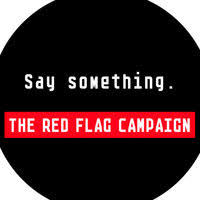Overview of The Red Flag Campaign at Northwestern
The Red Flag Campaign is a public awareness campaign designated to address dating violence and promote the prevention of dating violence on college campuses. Through using the “bystander intervention” strategy, the campaign encourages friends and other campus community members to “say something” when they see the warning signs (‘red flags’) for dating violence in a friend’s or other’s relationships.
Red Flag Campaign is a national public awareness campaign that was launched by the Virginia Sexual and Domestic Violence Action Alliance, working to prevent physical, sexual, emotional, and psychological dating violence, providing resources for college students. Typically, many college universities lawns will display red flag around campus, acknowledging the start of Red Flag Campaign. At Northwestern Community College, we display these throughout campus by tacking them on bulletin boards or on department windows to have students be notified of the start of Red Flag Campaign.
Northwestern Community College is an active participant in the Red Flag Campaign. Throughout the month of October, we will be hosting events that encourage students to participate and learn about the warning signs that could possibly come from relationships. To learn more about the events that we are hosting on campus, please contact the Director of Student Life & Community Resources, Dr. Ruth Gonzalez, rgonzalez@nwcc.edu
Healthy vs. Unhealthy Relationships
| Healthy Relationships | Unhealthy Relationships |
| Equality: Partner shares decisions and responsibilities. They discuss roles to make sure they’re fair and equal. | Control: One partner makes all the decisions and tells the other what to do, or tells that other person what to wear or who to spend time with. |
| Honesty: Partners share their dreams, fears, and concerns with each other. They tell each other how they feel and share important information | Dishonesty: One partner lies to keep information from the other. One partner steals from the other. |
| Physical Safety: Partners feel physically safe in their relationship and respect each others space | Physical Abuse: One Partner uses force to get their way (for example, hitting, slapping, grabbing, shoving) |
| Respect: Partners treat each other like they want to be treated and accept each other’s opinions, friends, and interests. They listen to each other. | Disrespect: One partner makes fun of the opinions and interests of the other partner. The partner may destroy something that belongs to the other partner. |
| Comfort: Partners feel safe with each other and respect each other’s differences. They realize when they’re wrong and are not afraid to say “I’m sorry”. Partners can ‘be themselves’ with each other. | Intimidation: One partner tries to control every aspect of the others life. One partner may attempt to keep their partner from friends and family or threaten violence or a breakup. |
| Sexual Respectfulness: Partners never force sexual activity or insist on doing something the other isn’t comfortable with. | Sexual Abuse: One partner pressures or forces other into sexual activity against their will or without consent. |
| Independence: Neither partner is dependent upon the other for an identity. Partners maintain friendships outside of the relationship. Either partner has the right to end the relationship. | Dependence: One partners says that they “can’t live without” the other. Partner may threaten to do something drastic if the relationship ends. |
| Humor: The relationship is enjoyable for both partners. Partners laugh and have fun. | Hostility: One partner may “walk on eggshells” to avoid upsetting the other. Teasing is mean-spirited. |

